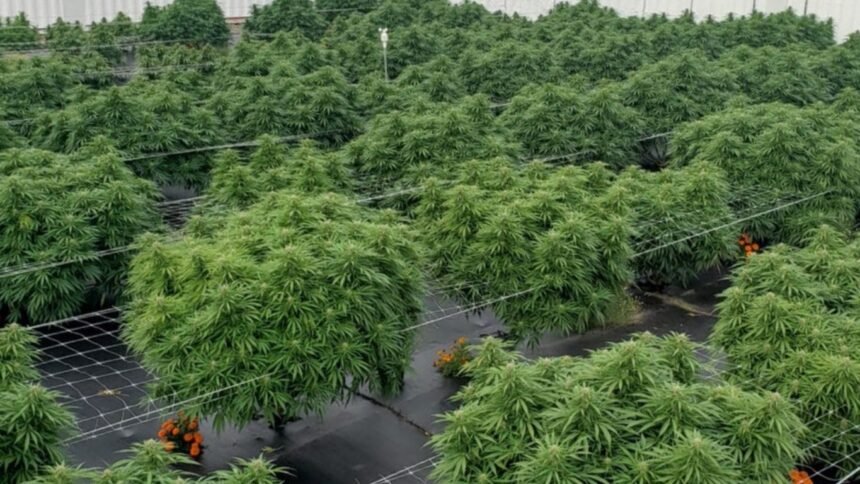The term “organic” carries a lot of weight in the food and agricultural industries, but when it comes to cannabis in Canada, its definition isn’t as straightforward. Unlike food products, which fall under the Canadian Food Inspection Agency (CFIA) and the Safe Food for Canadians Act, cannabis has yet to receive similar federal recognition. This leaves organic certification in the hands of third-party certifying bodies, leading to some variation in standards.
According to regenerative organic agronomist Av Singh, the lack of federal oversight means the definition of organic cannabis is largely determined by the independent certifiers already overseeing organic food products. “The word organic has been usurped by the Canadian Food Inspection Agency when it comes to anything related to food,” Singh explains. “The Safe Foods for Canadians Act has not recognized cannabis as food. So CFIA then says they don’t have to certify cannabis.” Despite this, third-party certifiers such as the Pacific Agricultural Certification Society (PACS), the Fraser Valley Organic Producers Association (FVOPA), and Pro-Cert, assess cannabis cultivation using organic standards similar to those applied to food. “They are the same people who are certifying our coffee, our strawberries, and our lettuce,” Singh added. One of the key factors these certifiers consider is the growing medium. For cannabis to be certified organic, growers must use a soil medium that includes an organic matter fraction and a mineral fraction—an essential distinction, as some cultivation methods, such as hydroponics and aeroponics, do not meet these criteria. However, because there is no single government body enforcing regulations, there is room for interpretation among certifiers. Singh points out that an individual’s personal definition of organic may also influence their view of certification. “If to you, organic has something to do with ecological sustainability, then the idea of growing a monoculture in a building using high amounts of energy may not mesh with your views of organic,” he says. Elliot Fromowitz, Organic Systems Advisor at Coast Mountain Cannabis, echoes this sentiment. “[The term] organic gets thrown around a lot these days, and honestly, it’s lost some of its meaning. Just because something is labelled organic doesn’t mean it’s clean or truly natural.” At Coast Mountain, the definition of organic extends beyond certification to long-term soil stewardship and clean inputs. “We think of organic as ‘alive and of the Earth.’ We’ve been using the same soil in our original grow rooms since November 2019, and we’re now on our 29th cycle. That’s a testament to the strength and sustainability of our system,” Fromowitz explains. For Coast Mountain, this means avoiding synthetic salts, preservatives, petroleum-based inputs, and solvent-based processing agents. Instead, they build their soil with carbon-rich matter, high-quality compost, humic and fulvic acids, and probiotics—creating a thriving biome where microbes feed the plants. The result, says Fromowitz, is flower with better terpene profiles, deeper aromas, and a smoother, cleaner smoke. Another leading producer is Rubicon Organics, certified by the FVOPA. The organization maintains both national and international relationships within the organic industry and works toward establishing equivalency with other certifiers worldwide. For Rubicon, organic certification goes beyond just the growing medium. Their day-to-day practices adhere to strict organic guidelines, including:- No genetically engineered products or organisms
- Organic-certified fertilizers that nurture microbial life in the soil
- No synthetic plant hormones or growth regulators
- Only permitted substances for pest control, as outlined in the Canadian Organic Standards
- No intentional use of nanotechnology
- No irradiation
- Certified packaging that meets FVOPA standards
- Biologically active soil as the required growing medium
- Mandatory composting of growing media, unless restricted by Health Canada
- Sunlight as a primary light source, with artificial light used only as a supplement
- Trellis materials that do not leach prohibited substances
The Importance of Being Earnest
Still, with different certifiers applying their own interpretations of organic principles, transparency becomes key. “One of the simplest things consumers can do is check for a listed certifying body,” says Fromowitz. “If a company is truly organic, they’ll be transparent about who certified them—it’ll be on the packaging, their website, or both. No hiding.” Fromowitz encourages consumers to look beyond the label. “Ask how they’re growing. Are they using living soil long-term? What kind of inputs are they feeding their soil? Do they talk about preserving the microbiome?” He believes that real organic growing is about more than skipping synthetics—it’s about building and sustaining a balanced, living system. To that end, Rubicon Organics believes cannabis should be included under the same federal governing bodies that oversee organic food products. “It should fall under the federal governing bodies as per other food products and allow cannabis producers to use the Canadian Organic logo if they abide by licensed organic standards,” said COO Melanie Ramsey. “A national standard for cannabis further legitimizes this industry alongside all other food industries.” Ramsey adds that a federally regulated organic standard would ensure transparency, safety, sustainability, and consistency across the industry. It would also provide clarity for consumers, retailers, and provincial distributors, ensuring they can trust its meaning when they see an organic label. Until such a system is in place, cannabis producers looking for organic certification will continue to work with independent certifiers, each of whom applies similar—but not identical—standards. For now, what makes cannabis “organic” in Canada remains, in part, a matter of interpretation—but to the country’s most committed cultivators, it’s a living philosophy rooted in ecology, transparency, and trust.Feature image of New Brunswick’s Wildwood Flowr, an outdoor micro grower using regenerative farming practices.













